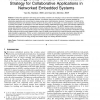Free Online Productivity Tools
i2Speak
i2Symbol
i2OCR
iTex2Img
iWeb2Print
iWeb2Shot
i2Type
iPdf2Split
iPdf2Merge
i2Bopomofo
i2Arabic
i2Style
i2Image
i2PDF
iLatex2Rtf
Sci2ools
124
Voted
TC
2008
2008
An Energy-Delay Tunable Task Allocation Strategy for Collaborative Applications in Networked Embedded Systems
Collaborative applications with energy and low-delay constraints are emerging in various networked embedded systems like wireless sensor networks and multimedia terminals. Conventional energy-aware task allocation schemes developed for collaborative applications only concentrated on energy savings when making allocation decisions. Consequently, the length of the schedules generated by such allocation schemes could be very long, which is unfavorable or, in some situations, even not tolerated. To remedy this problem, we developed a novel task allocation strategy called Balanced Energy-Aware Task Allocation (BEATA) for collaborative applications running on heterogeneous networked embedded systems. The BEATA algorithm aims at blending an energy-delay efficiency scheme with task allocations, thereby making the best trade-offs between energy savings and schedule lengths. Aside from that, we introduced the concept of an energy-adaptive window, which is a critical parameter in the BEATA strate...
Collaborative Applications | Energy-aware Task Allocation | Information Technology | Task Allocations | TC 2008 |
| Added | 15 Dec 2010 |
| Updated | 15 Dec 2010 |
| Type | Journal |
| Year | 2008 |
| Where | TC |
| Authors | Tao Xie 0004, Xiao Qin |
Comments (0)

